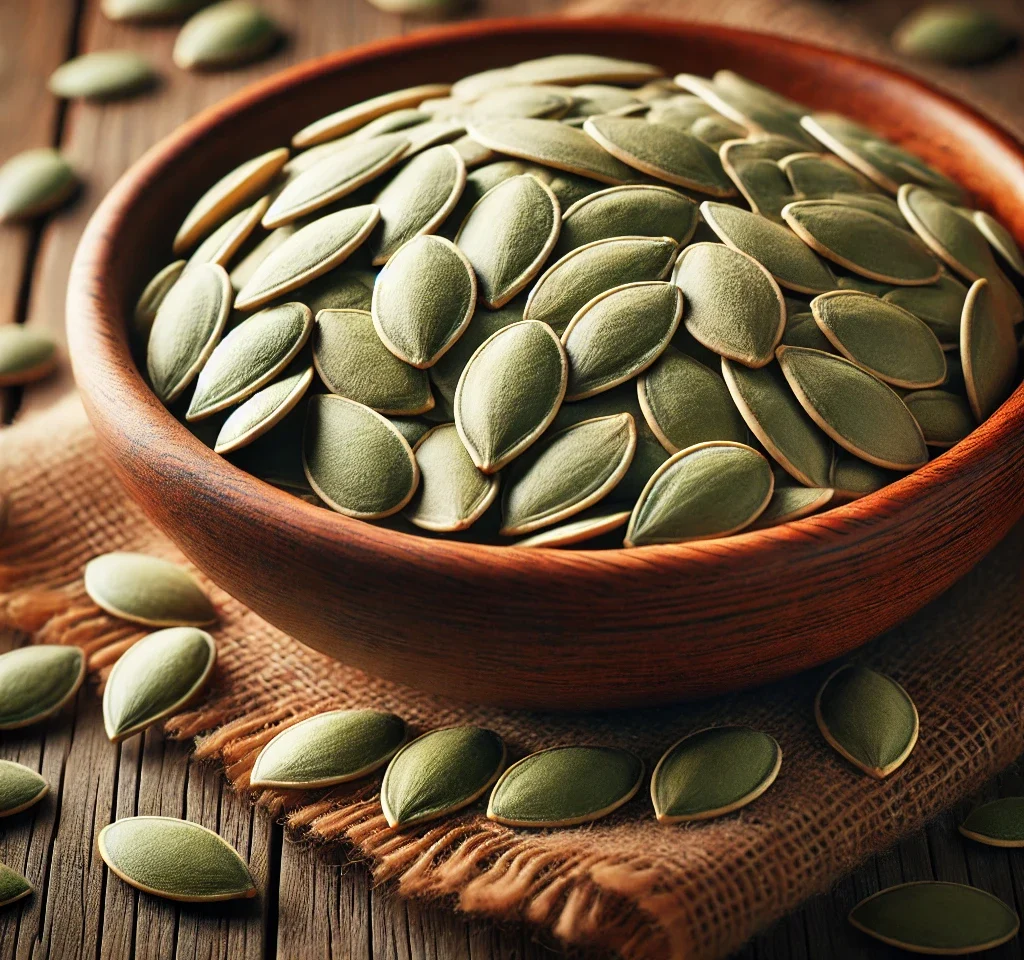Pumpkin seeds are a nutrient-dense superfood that offers a wide range of health benefits. Packed with protein, healthy fats, fiber, and essential minerals like magnesium, zinc, and iron, these small but powerful seeds can contribute to heart health, improved digestion, and enhanced immune function. Eaten raw, roasted, and added to various dishes, pumpkin seeds are a simple and delicious way to boost your daily nutrition.
Nutritional Benefits of Pumpkin Seeds
Rich in Nutrients: Pumpkin seeds are an excellent source of high-quality protein, healthy fats (including omega-3 and omega-6 fatty acids), and a variety of vitamins such as vitamin E, vitamin K, and several B vitamins. These seeds are also rich in important minerals, including magnesium, zinc, iron, phosphorus, and potassium.
Source of Plant-based Protein: Pumpkin seeds are a great plant-based source of protein, containing about 7 grams of protein per ounce. This makes them an excellent option for vegetarians and vegans looking to boost their protein intake for muscle repair, immune function, and overall body health.
Rich in Healthy Fats: Pumpkin seeds are rich in healthy fats, particularly omega-3 and omega-6 fatty acids, which help support heart health, reduce inflammation, and promote brain function. These fats also contribute to healthy skin and support hormone balance.
Packed with Antioxidants: These seeds are loaded with antioxidants, such as vitamin E and carotenoids, which help protect the body from oxidative stress, reduce inflammation, and lower the risk of chronic diseases like heart disease and cancer.
Supports Heart Health: The combination of healthy fats, antioxidants, magnesium, and zinc in pumpkin seeds promotes heart health. These nutrients work together to reduce bad cholesterol (LDL), lower blood pressure, and improve blood flow, which can reduce the risk of cardiovascular disease.
High in Magnesium: Pumpkin seeds are one of the best sources of magnesium, which plays a crucial role in muscle function, nerve transmission, and bone health. Adequate magnesium intake also helps regulate blood sugar levels and may reduce the risk of heart disease.
Promotes Healthy Sleep: Pumpkin seeds are naturally high in tryptophan, an amino acid that helps produce serotonin and melatonin, hormones that regulate sleep. Consuming pumpkin seeds may improve sleep quality and help with conditions like insomnia.
Supports Immune Function: The zinc content in pumpkin seeds is essential for maintaining a healthy immune system. Zinc helps the body fight off infections, promotes wound healing, and supports cellular function.
Aids in Digestion: Pumpkin seeds are a good source of fiber, which promotes healthy digestion and regular bowel movements. They can help prevent constipation and support overall gut health.
Supports Prostate Health: Pumpkin seeds are known to support prostate health, particularly in men. The antioxidants, zinc, and other nutrients in these seeds may help reduce the risk of benign prostatic hyperplasia (BPH), a condition that causes enlargement of the prostate.
Helps Manage Blood Sugar Levels: The high fiber and healthy fat content in pumpkin seeds can help regulate blood sugar levels, making them a beneficial snack for people with diabetes or those at risk of developing the condition.
Uses of Pumpkin Seeds
Snacks: Pumpkin seeds can be eaten raw, roasted, or spiced as a nutritious snack. They can be enjoyed on their own or mixed with other nuts and seeds.
Culinary Uses: They can be added to salads, granola, oatmeal, and baked goods for added crunch and nutrition.
Pumpkin Seed Oil: Extracted from the seeds, pumpkin seed oil is used in salad dressings, cooking, and as a finishing oil for various dishes.
Nut Butters: Pumpkin seed butter is a delicious alternative to traditional nut butters and can be used in spreads or smoothies.
Safety Considerations
Allergies: While pumpkin seed allergies are less common than nut allergies, some individuals may still be allergic. Discontinue use if any adverse reactions occur.
Caloric Density: Pumpkin seeds are calorie-dense, so portion control is important, especially for individuals managing their weight.
Sodium Content: Salted pumpkin seeds can be high in sodium, which may not be suitable for individuals on a low-sodium diet. Opting for unsalted varieties can help mitigate this concern.
Interactions with Medications: Pumpkin seeds may interact with certain medications, particularly those affecting blood pressure or blood sugar levels. Consult a healthcare provider if you are on medication.
Conclusion
Pumpkin seeds are a versatile and highly nutritious addition to any diet. Their rich content of essential nutrients, including protein, healthy fats, and vital minerals, makes them an excellent choice for promoting heart health, digestion, and immune function. Enjoyed as a snack, sprinkled on salads, and blended into smoothies, these tiny seeds pack a powerful nutritional punch. By incorporating pumpkin seeds into your daily routine, you can take a simple yet effective step toward better health and well-being.
